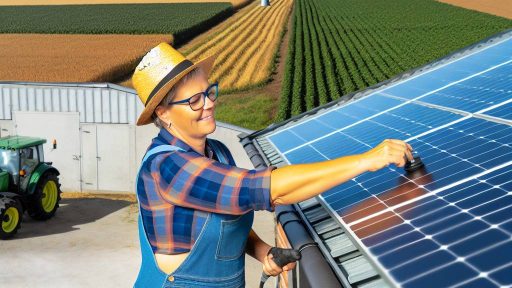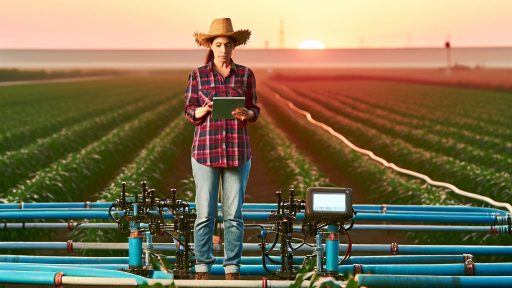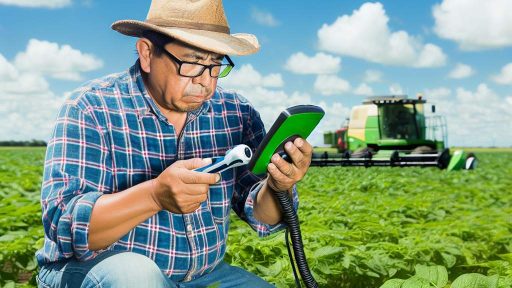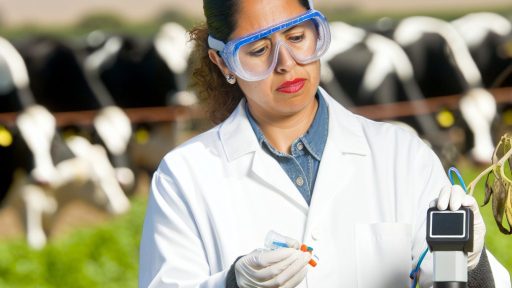Introduction to Precision Farming in Controlled Environment Agriculture
Precision farming revolutionizes agriculture in controlled environments.
This technique optimizes resource use and improves crop yield.
Additionally, it leverages technology for efficient farming practices.
Farmers can monitor and manage their crops remotely.
Defining Precision Farming
Precision farming emphasizes data-driven decision-making.
This approach uses advanced technologies, such as sensors and drones.
Farmers can analyze soil conditions and plant health in real-time.
Ultimately, this leads to better crop management strategies.
Benefits of Precision Farming Techniques
One key benefit is resource efficiency.
Farmers can reduce water and fertilizer usage significantly.
Moreover, this technique minimizes waste and environmental impact.
Precision farming also enhances crop quality and consistency.
Technologies Enabling Precision Farming
Numerous technologies support precision farming initiatives.
These include climate control systems and IoT devices.
Data analytics tools provide insights into crop performance.
Transform Your Agribusiness
Unlock your farm's potential with expert advice tailored to your needs. Get actionable steps that drive real results.
Get StartedRemote sensing technology offers valuable data on crop health.
Climate Control Systems
Climate control systems regulate temperature and humidity.
They ensure optimal growing conditions for plants.
Farmers can adjust settings based on real-time data.
IoT Devices
IoT devices connect various farming elements seamlessly.
These devices transmit crucial information to farmers.
Consequently, it allows for timely interventions.
Implementing Precision Farming Strategies
Successful implementation requires thorough planning.
Farmers should identify specific goals and objectives.
Next, they must assess the technology needs of their operations.
Training staff on these new technologies is essential.
They also need to monitor progress and make adjustments.
Setting Goals and Objectives
Establish clear, measurable goals for crop production.
Determine targets for yield improvement and resource conservation.
Assessing Technology Needs
Evaluate existing equipment and software capabilities.
Consider investing in new technologies for greater efficiency.
Monitoring and Adjusting
Continuous monitoring of crop and environmental data is vital.
Adjust strategies based on emerging data and trends.
Benefits of Precision Farming Techniques
Improved Yield and Quality
Precision farming enhances crop yield significantly.
This method maximizes resource use efficiently.
It focuses on delivering the right amount of inputs.
Consequently, crops receive optimal nutrients.
Thus, the overall quality of produce increases.
Resource Efficiency
Precision techniques minimize waste of resources.
Showcase Your Farming Business
Publish your professional farming services profile on our blog for a one-time fee of $200 and reach a dedicated audience of farmers and agribusiness owners.
Publish Your ProfileFarmers can apply inputs where they are needed most.
This leads to lower usage of fertilizers and pesticides.
Saving resources reduces operational costs substantially.
Moreover, it conserves water through targeted irrigation.
Environmental Sustainability
These techniques promote environmentally friendly practices.
By reducing chemical runoff, they enhance soil health.
This approach helps protect local ecosystems.
Fewer inputs lead to lower carbon emissions overall.
Thus, precision farming supports sustainable agriculture.
Data-Driven Decision Making
Precision farming relies on comprehensive data analysis.
This empowers farmers to make informed decisions.
Utilizing technology, they can monitor field conditions closely.
As a result, problem areas can be identified early.
Timely interventions can enhance productivity greatly.
Economic Benefits
Farmers experience improved economic returns.
Precision techniques can lead to increased profitability.
Higher efficiency translates to cost savings over time.
Investing in technology can yield substantial long-term gains.
Ultimately, these benefits contribute to rural economic development.
Key Technologies Used in Precision Farming
Satellite Imagery
Satellite imagery provides detailed views of large agricultural areas.
This technology helps farmers assess crop health and monitor growth.
Moreover, it allows for quick identification of problem areas.
Farmers can use this data to make informed management decisions.
Global Positioning Systems (GPS)
GPS technology enables precise navigation across agricultural fields.
It aids in the accurate placement of seeds and fertilizers.
Furthermore, GPS enhances the efficiency of field operations.
This leads to reduced costs and increased yields.
Remote Sensing
Remote sensing captures data from various sensors on drones or planes.
This technology monitors soil and crop conditions from above.
Additionally, it can provide real-time information for management decisions.
Farmers can identify water stress and nutrient deficiencies rapidly.
Internet of Things (IoT)
The IoT connects various smart devices across the farm.
Sensors monitor environmental conditions and soil moisture levels.
This data is transmitted for analysis in real-time.
Consequently, farmers can optimize irrigation and reduce water usage.
Data Analytics
Data analytics turns raw data into actionable insights.
Farmers can use this technology to track performance over time.
Additionally, it helps identify trends and forecast future needs.
This predictive capability supports better planning and resource management.
Automation and Robotics
Automation increases efficiency in various farming tasks.
Showcase Your Farming Business
Publish your professional farming services profile on our blog for a one-time fee of $200 and reach a dedicated audience of farmers and agribusiness owners.
Publish Your ProfileRobots can plant, weed, and harvest crops with precision.
This technology minimizes labor costs and enhances productivity.
Moreover, it reduces the environmental impact of farming practices.
Find Out More: How To Choose The Right Agri-Fintech Solution For Your Farm Needs
Soil and Plant Monitoring Technologies
Introduction to Monitoring Technologies
Monitoring technologies play a crucial role in precision farming.
They help optimize crop yields and improve overall efficiency.
Modern tools allow farmers to gather valuable data in real-time.
Types of Monitoring Technologies
Various technologies aid in soil and plant monitoring.
They range from traditional methods to advanced digital systems.
- Sensors collect data on soil moisture and temperature.
- Satellite imagery provides insights into plant health.
- Drones deliver aerial views for crop assessment.
Benefits of Soil Monitoring
Soil monitoring enhances agricultural productivity significantly.
It allows farmers to understand nutrient levels in the soil.
Additionally, it helps in diagnosing potential issues early.
Consequently, farmers can make informed decisions for soil management.
Improving Irrigation Techniques
Soil moisture sensors provide essential data for irrigation scheduling.
As a result, farmers can prevent over- or under-watering.
Efficient irrigation practices lead to water conservation.
Advantages of Plant Monitoring
Plant monitoring focuses on crop health and growth conditions.
It aids in early detection of diseases and pests.
This proactive approach minimizes crop losses and yields higher profits.
Utilizing Remote Sensing
Remote sensing technologies have transformed how farmers observe crops.
These methods enable non-invasive monitoring of plant conditions.
Moreover, they capture data over large areas quickly.
Integrating Data with Management Systems
Data from monitoring technologies can be integrated into management systems.
This integration improves decision-making in agriculture.
Farmers can analyze trends and patterns over time effectively.
Ultimately, this leads to optimized resources and better crop outcomes.
See Related Content: Future Trends In Genetically Modified Agricultural Technology
Automated Irrigation Systems for Precision Farming
Introduction to Automated Irrigation
Automated irrigation systems are revolutionizing controlled environment agriculture.
They provide precise water delivery based on plant needs.
This technology optimizes water usage and reduces waste.
Farmers can program these systems to respond to various conditions.
Types of Automated Irrigation Systems
There are several types of automated irrigation systems available.
- Drip irrigation delivers water directly to plant roots.
- Sprinkler systems distribute water through the air.
- Subsurface irrigation places water below the soil surface.
Each system has unique benefits depending on crop requirements.
Benefits of Automated Irrigation Systems
Automated irrigation systems enhance water efficiency significantly.
They can optimize water application rates as needed.
This leads to healthier plants and higher crop yields.
Moreover, they can reduce labor costs for farmers.
Integration with Sensors and Technology
Integrating sensors with automated systems improves precision.
Soil moisture sensors trigger irrigation only when necessary.
This approach avoids over and under-watering.
Showcase Your Farming Business
Publish your professional farming services profile on our blog for a one-time fee of $200 and reach a dedicated audience of farmers and agribusiness owners.
Publish Your ProfileFurthermore, climate data integration ensures timely watering.
Challenges and Considerations
Despite their advantages, automated irrigation systems have challenges.
The initial setup cost can be high for farmers.
Additionally, technical knowledge is required to operate these systems.
Regular maintenance ensures consistent performance.
Future of Automated Irrigation in Precision Farming
The future of automated irrigation in precision farming looks promising.
Advancements in technology will lead to smarter systems.
These innovations will further enhance efficiency and sustainability.
Farmers will continue to adopt these systems for improved yields.
Uncover the Details: Exploring Biotech-Based Fertilizers And Their Benefits
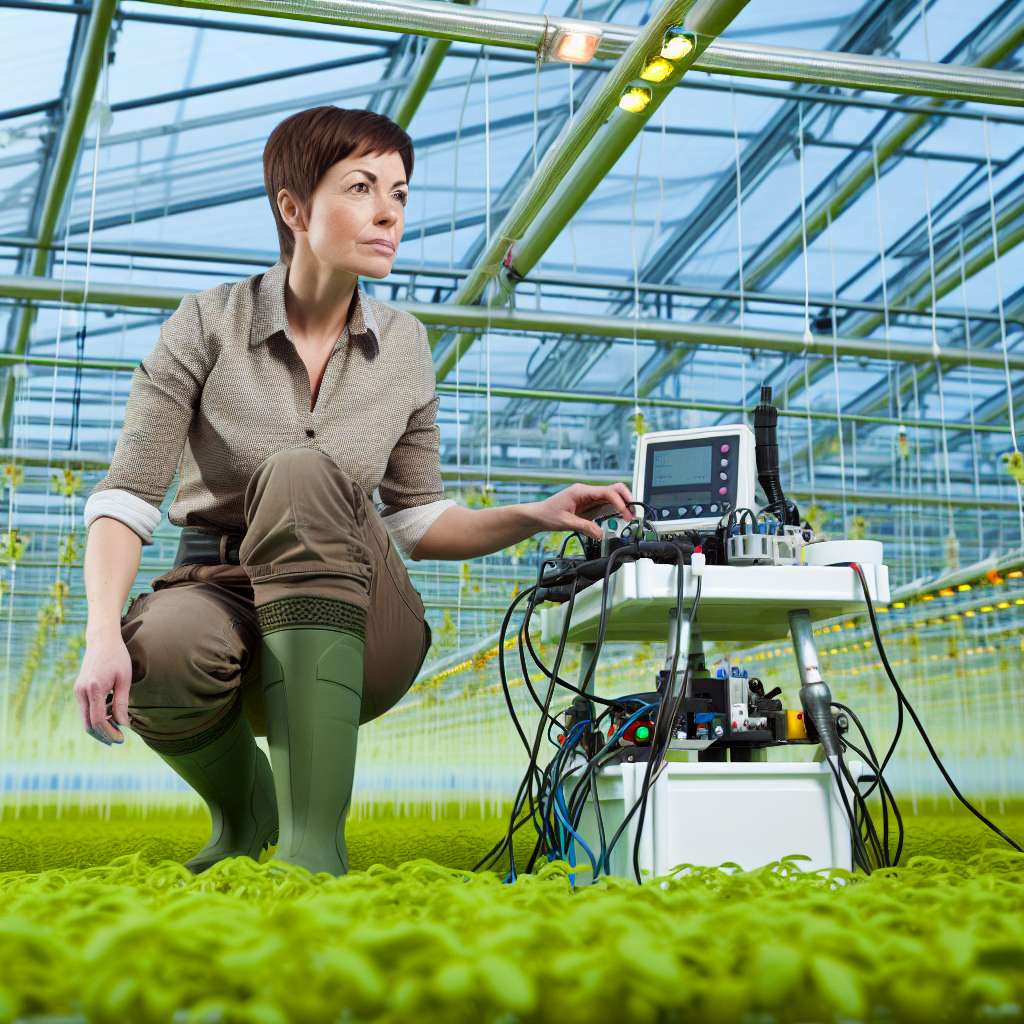
Data Management and Analysis in Controlled Environments
The Role of Data in Precision Farming
Data plays a crucial role in precision farming techniques.
Farmers use data to monitor environmental conditions.
This information helps optimize resource allocation.
Moreover, real-time data enables swift decision-making.
Data analysis enhances crop yield and quality.
Types of Data Collected
Various types of data are essential in controlled environments.
Firstly, environmental data includes temperature and humidity levels.
These factors significantly influence plant growth.
Secondly, soil health data includes nutrient levels and pH balance.
This information helps in adjusting fertilizers accordingly.
Finally, growth data tracks plant height and biomass production.
Data Management Practices
Effective data management is vital for success.
Farmers utilize cloud-based systems for storage and access.
This allows for easy sharing among stakeholders.
Additionally, data visualization tools help interpret complex datasets.
This process does improve operational efficiency.
Implementing Data Analysis Techniques
Farmers adopt various analysis techniques for better outcomes.
Statistical analysis helps identify trends and patterns.
Machine learning algorithms predict future crop performance.
Furthermore, simulation models assess different farming scenarios.
Using these techniques leads to enhanced decision-making.
Challenges in Data Management
Data management presents certain challenges.
Data security concerns require robust protection measures.
Moreover, data integration from multiple sources can be complex.
Farmers also struggle with large volumes of data.
Therefore, finding efficient ways to process this data matters.
Future Directions in Data Management
Innovation in technology will shape future data management practices.
Integration of IoT devices will enhance data collection processes.
Artificial intelligence will further improve data analysis capabilities.
Furthermore, predictive analytics will become commonplace in farming.
Showcase Your Farming Business
Publish your professional farming services profile on our blog for a one-time fee of $200 and reach a dedicated audience of farmers and agribusiness owners.
Publish Your ProfileThese advancements will drive sustainable agricultural practices.
See Related Content: Integrating Blockchain To Boost Farm-to-Fork Supply Chain Transparency
Case Studies: Successful Implementation of Precision Farming
Innovative Technologies at GreenLeaf Farms
GreenLeaf Farms successfully integrated precision farming techniques.
They utilized drones for crop monitoring and data collection.
Moreover, their use of soil sensors improved nutrient management.
As a result, they achieved a 30% reduction in water usage.
Farmers reported higher yields with lower input costs.
Advanced Systems at EcoGrow Solutions
EcoGrow Solutions adopted hydroponic systems for vegetable production.
They implemented real-time data analytics for optimal growth conditions.
This approach increased their crop cycle frequency significantly.
Consequently, they enhanced overall productivity by approximately 25%.
Farmers appreciated the system for its consistency and efficiency.
Case Study: AgriTech Innovations
AgriTech Innovations leveraged AI technology for decision-making.
The company analyzed historical data to predict crop performance.
Using machine learning, they fine-tuned pesticide application schedules.
This led to a dramatic decrease in pesticide use, enhancing sustainability.
Additionally, they reported improved crop quality and resilience.
Success Stories from Urban Farms
Urban farms like CityHarvest applied vertical farming techniques.
They utilized LED lighting to optimize plant growth indoors.
Through precise environmental control, they maintained optimal conditions.
This method minimized land use while maximizing output.
As a result, urban farmers met local food demands effectively.
Sustainable Practices at TerraBio Farms
TerraBio Farms adopted organic precision farming methods.
They utilized precision irrigation systems to conserve water.
Furthermore, they used cover crops to improve soil health naturally.
This sustainable approach attracted eco-conscious consumers to their products.
Ultimately, they experienced a boost in market presence and sales.
Future Trends in Precision Farming for Controlled Environment Agriculture
Integration of Advanced Technologies
Emerging technologies are set to revolutionize precision farming.
The use of artificial intelligence will enhance decision-making processes.
Additionally, machine learning algorithms will analyze data efficiently.
These technologies will optimize resources and improve crop yields.
Increased Use of IoT Devices
The Internet of Things (IoT) will play a vital role in agriculture.
Farmers will deploy smart sensors to monitor environmental conditions.
These devices will provide real-time data for better management.
Consequently, farmers can make timely adjustments to their practices.
Emphasis on Sustainability
Future trends will focus on sustainable farming practices.
Farmers will implement techniques that conserve water and energy.
Additionally, precision agriculture will reduce chemical inputs.
Such methods will contribute to healthier ecosystems in urban areas.
Enhanced Data Analytics
Data analytics will become increasingly important in farming.
Showcase Your Farming Business
Publish your professional farming services profile on our blog for a one-time fee of $200 and reach a dedicated audience of farmers and agribusiness owners.
Publish Your ProfileFarmers will leverage big data to gain valuable insights.
Furthermore, predictive analytics will enable proactive crop management.
These tools will foster a more responsive approach to agriculture.
Collaboration Among Stakeholders
The future of precision farming will involve collaboration between sectors.
Researchers will work alongside farmers to develop innovative solutions.
Companies will partner to share technology and expertise.
This collaboration will drive advancements in controlled environment agriculture.
Additional Resources
Vertical Farming – No Longer A Futuristic Concept : USDA ARS

